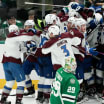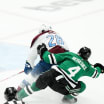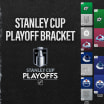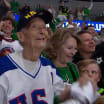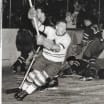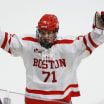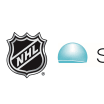Growing up in Crowland, Ontario, Pat Kelly's dream simply was to play for the town's bantam hockey team.
After helping Crowland win the Bantam B Championship of Ontario in 1949, Kelly turned to his father and said, "Dad, I've got to be a hockey player."
Kelly began his playing career in 1952 with the St. Catherine Tee Pees of the Ontario Junior Hockey League and has been involved in the game in almost every aspect during the 64 years since then as a player, player-coach, coach, general manager, commissioner and one of the co-founders of the ECHL.
Pat Kelly's contributions to hockey go back 64 years
First ECHL Commissioner to receive Lester Patrick Trophy
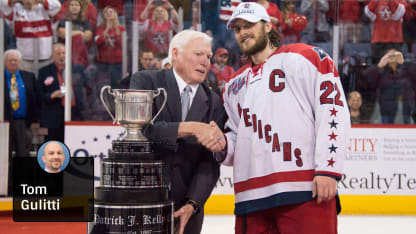
To honor his many contributions Kelly, along with Hockey Hall of Fame member Mark Howe, will receive the Lester Patrick Trophy for outstanding service to hockey in the United States during the U.S. Hockey Hall of Fame induction ceremony in Philadelphia on Nov. 30.
Kelly, who still serves as ECHL Commissioner Emeritus and a supervisor of officials in the ECHL and American Hockey League, said he was "without words" when NHL Commissioner Gary Bettman called to inform him he'd be one of the recipients of the Lester Patrick Trophy this year.
"I always thought my biggest thrill in life would be when I coached the Colorado Rockies in 1977-78, but when the East Coast Hockey League named the Kelly Cup after me, that was incredible," Kelly said. "And to receive the Lester Patrick Trophy, that's right up there with everything in this life."
Kelly, 81, has enjoyed an incredible hockey life with his wife, June, by his side for almost all of it.
"We just passed our 63rd anniversary on Oct. 10 and I'm in my 64th year of hockey and she's the biggest part of this," Kelly said. "She probably deserves an award just as much as I do for getting me through all this for the past 63 years."
Kelly's name is synonymous with the ECHL, which he helped found in 1988 along with Henry Brabham, who owned three of the original five teams, Bill Coffey and John Baker. But Kelly also coached and/or played in the NHL, World Hockey Association, AHL, International Hockey League, Eastern Hockey League, Southern Hockey League, Atlantic Coast Hockey League and the Ontario Junior Hockey League.
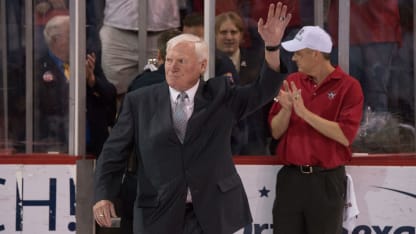
Kelly served as the ECHL commissioner for its first eight seasons. He was named commissioner emeritus prior to the 1996-97 season, and the league's original championship trophy, the Riley Cup, was replaced by the Kelly Cup in his honor. Kelly presents the Kelly Cup to the ECHL champion each season.
"He's a treasure to our league. He really is," current ECHL Commissioner Brian McKenna said. "He's been an ambassador for the ECHL for many years and just an ambassador for hockey as well. He still goes to goes to games, supervises games on our behalf. He still comes to our meetings, which is great because those who are new to the league can get to know him and spend some time with him. And he's on hand each year in our playoffs and hands out the Kelly Cup, which I think means a lot more to the champion that it's being awarded to them by the man whose name is on the Cup."
Kelly initially was opposed to having his name on the trophy. It had been Kelly's idea to name the championship trophy after Jack Riley, the former AHL president and the Pittsburgh Penguins' first general manager.
"When they told me in 1996 they were going to change the name of the Cup to the Kelly Cup and I said, 'No you're not. I know Mr. Riley and I respect him,'" Kelly said. "They said they talked to Mr. Riley and he gave us his blessing and, 'Your name should have been on it in the first place.' When I talked to Mr. Riley, he said, 'That's your trophy with my blessing. Don't even think about it.'"
Colorado College coach and former Chicago Blackhawks assistant Mike Haviland, who played in the ECHL in 1990-91, met Kelly when he coached the Atlantic City Boardwalk Bullies to the Kelly Cup in 2002-03. Haviland won it again in 2004-05 with the Trenton Titans.
"I know Pat very well," Haviland said. "He's just a wonderful man and has so much passion for the game and what he did for that league was just outstanding. There's so many people Pat really helped in their life, me being one of them, and I'm sure a lot of guys are saying the same thing. I owe an awful lot to him for making that league what it is."
When he helped start the ECHL, Kelly already had been in professional hockey for 36 years and was coming off five seasons coaching the Peoria Rivermen, who he guided to the Turner Cup in the IHL in 1984-85.
That is one of six league championships on Kelly's coaching resume. He also won three consecutive Walker Cup EHL titles with the Clinton Comets as a player-coach in 1967-68, 1968-69 and 1969-70, and was coach and GM of the Charlotte Checkers when they won back-to-back Crocket Cups in the SHL in 1974-75 and 1975-76.
Kelly listed his championships as a player-coach with the Comets, based in Clinton, New York, as among his finest achievements. A left-shooting defenseman, Kelly had six goals and 62 assists in 72 games in helping the Comets go 57-5-10 in 1967-68.
They remain the lone professional hockey team to finish with as few as five losses.
"To have that accomplishment with the players I had on that team was something great, and to win the [regular season] championship and the playoff championship three years in a row was unbelievable," Kelly said.
From the 1967-68 team, left wing Bill Heindl went on to have brief NHL stints with the Minnesota North Stars and New York Rangers, and center Rod Zaine played for the Pittsburgh Penguins and Buffalo Sabres. Prior to the NHL expanding from six to 12 teams in 1967-68, there weren't many opportunities to move up and play at that level for those toiling in leagues like the EHL.
But Kelly has fond memories of those times.
"It was pretty tough for all of us in those old Eastern League days," he said. "We only had 14 guys on a team back then, and lots of nights you would go into a game with 11 or 12 guys. You had to change players right away. You had no reserves. If you had some guys hurt you had to go into Canada or someplace in the United States and find some more."
When the EHL ceased operations following the 1972-73 season, Kelly moved on to the Checkers for four seasons before jumping to the WHA to coach the Birmingham Bulls in 1976-77. That led to his chance in the NHL with the Rockies, who made their only Stanley Cup Playoff appearance in 1977-78 with Kelly behind their bench. He was fired 21 games into the following season.
"I got fired because the team wasn't winning," he said. "I was 3-14-4 and they ended up winning 15 games total."
Stints in Rochester (AHL), Binghamton (AHL), Salem/Virginia (ACHL) and Peoria followed before Kelly decided at age 52 that it might be time for him to get into another line of work. That plan changed when Brabham convinced him to become the first commissioner of the ECHL.
"The money he offered me was just terrible," Kelly said. "I said, 'Henry, you think I can bring my wife up to Roanoke, Virginia on that kind of salary?' He said, 'Well, I've got some other ideas.' I said, 'I hope they're a lot better than that one.'"
The ECHL began play in 1988-89 with five teams: the Carolina Thunderbirds, Erie Panthers, Johnstown Chiefs, Knoxville Cherokees and Virginia Lancers. To supplement his salary, Kelly doubled as the arena manager in Vinton, Va., where the Lancers played.
"When the Zamboni driver didn't show up on a Friday or Saturday night, I'd be on the ice [resurfacing] the ice with my shirt and tie and suit on," Kelly said. "But we got it going."
With an intention for the ECHL to be a family-friendly league, Kelly tried to "get rid of the brawling on the ice that was going on in all of these minor league games" by implementing rules that resulted in suspensions for players who had repeated game misconducts and coaches whose players left the bench to participate in fights. Kelly's commitment to this issue was most evident during the inaugural ECHL championship series when Carolina had to play Game 7 in Johnstown with 11 skaters because of injuries and the suspensions of three players.
Carolina still won the game 7-4 and Kelly earned the respect of the players in the process. Florida Panthers assistant coach Scott Allen, who played on that Carolina team and later coached in the ECHL with Johnstown, says he loves seeing Kelly whenever he runs into him.
"Mr. Kelly probably wasn't anybody who played for the Carolina Thunderbirds favorite guy that night, but he had a job to do and he did the job that was necessary," Allen said. "When you look beyond it, I've got nothing but respect for the man."
Kelly gave up his rink manager duties to concentrate fully on being commissioner when the ECHL expanded to eight teams in 1989-90. The league added three more teams in 1990-91 and was up to 21 by 1995-96, Kelly's final season as commissioner.
"I think the big thing was when Jacksonville, Florida came in (1995-96) and we opened up the I-10 corridor," Kelly said. "We had a whole division there. We went from Jacksonville to Tallahassee, Pensacola, New Orleans, Baton Rouge and Lafayette, Louisiana. So it was one whole division. And Fort Myers, Florida, came in also, which is still in our league today.
"I always felt like maybe us going into Fort Myers and Tallahassee and Jacksonville and all those places that it helped the NHL go into Florida with the team in Tampa Bay and one in Fort Lauderdale."
McKenna believes that Kelly's influence in growing hockey in the South was a "key element" in him being recognized with the Lester Patrick Trophy.
"That goes back to his days coaching in the WHA and playing in the old Eastern League and the Southern Hockey League in places like Charlotte and Greensboro and then more recently with the start of the ECHL in 1988-89," McKenna said. "It was largely a league that started in the South and expanded from there. As a result, what has happened is you've got literally dozens of cities, communities that hadn't been exposed to the sport of ice hockey before that were exposed to it through the introduction of the ECHL or other leagues that he was involved with."
